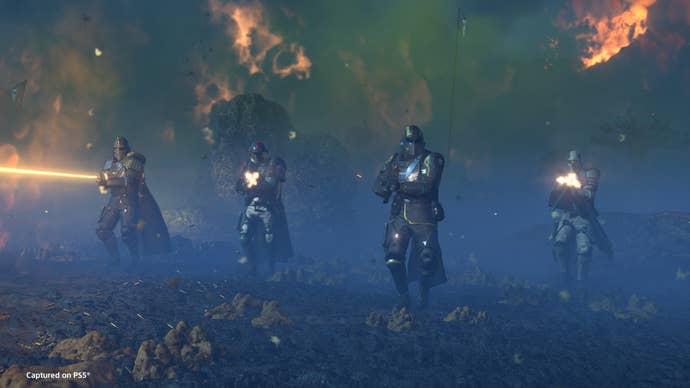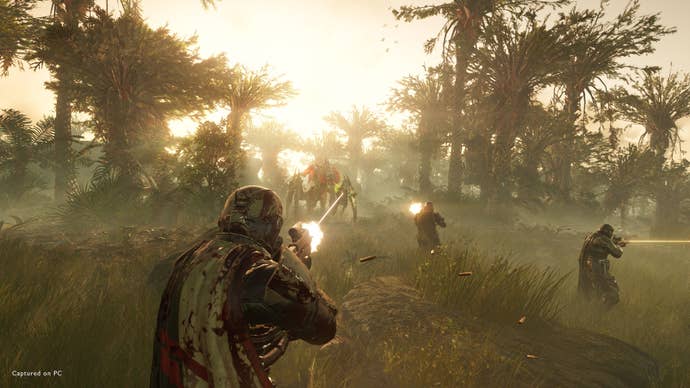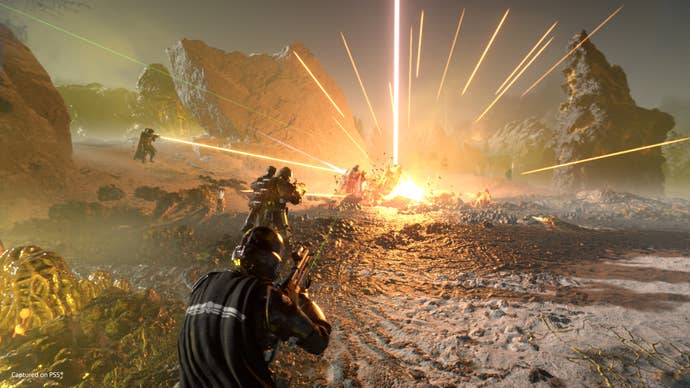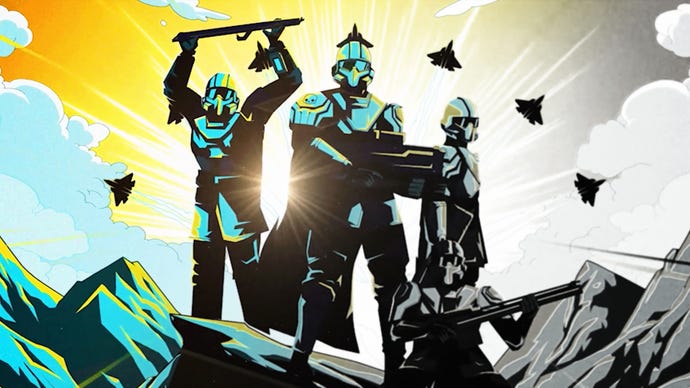Helldivers 2 is not afraid to kill you often, and that's one of the best things about it
Helldivers 2 does an exceptional job at melding high stakes with the act of offering a power trip.
I’ve often been fond of how two seemingly identical games can rely on similar elements, yet produce entirely different feelings. There’s a lot to be said about presentation, in-game resource scarcity, damage models, mechanical complexity and so on, but one thing that tends to tip the scales one way or another is how high the stakes are.
Helldivers 2 is the latest reminder that you can have a bunch of different currencies, several crafting materials, a quasi-loot system, and an always-online requirement - but still manage to create a solid co-op game that isn’t, well, like any of the other mediocre live service games we can’t seem to get rid of.
There’s a lot to like about Helldivers 2. Its commitment to lifting Starship Troopers’ thematic schtick is only one facet of its presentation; its robot faction owes a lot to Terminator, and its armour and weapon designs have their roots in Star Wars, Halo and half-a-dozen other sci-fi staples.
Its gameplay isn’t actually entirely new, either. This is, more or less, the same game as its predecessor, just played from a third-person perspective instead of an overhead one. This isn’t to say making that transition was trivial; I genuinely struggle to name more than a couple of games that managed to retain as much of what made them tick after changing genre or camera perspective.
That change in perspective gives new meaning to the experience the original game has always been tremendously good at delivering. In fact, I’d even say the limited view you get from an over-the-shoulder camera compared to isometric is yet another reason the sequel can be as intense as it is. You simply have a less information at any given moment, which automatically adds more weight to even the most trivial of encounters.
But one thing persisted between the two, and it’s a core component of why the Helldivers formula works: stakes.

No, this isn’t a survival game, or an extraction shooter where you put everything on the line the moment you enter a match. It’s a standard co-op affair where sessions last 30 minutes or less; dying isn’t the end of the world, you can simply launch a new mission and continue playing. You do, of course, lose XP and whatever samples or collectibles you might have gathered in the mission you failed, which is one element of the formula.
Even without that potential loss on the line, the moment-to-moment of Helldivers 2 is reminiscent of the Left 4 Dead games because it knows how to toy with your emotions well, alternating between moments where you feel overpowered and those that make you wonder how you’d even managed to scrape by.

One of Helldivers 2’s most clever tricks is its reliance on analogue interactions. In most games, starting a zone defence sequence, summoning a boss or setting up some sort of scripted encounter only really requires you to walk up to a button and press it; the game does the rest. In Helldivers, that same event is made all the more meaningful because the game requires you to input a sequence of buttons, ensuring that you have the utmost agency in making that decision.
You don’t feel like you’re turning on a fake radar tower in a video game; you feel like you’re in control of a crucial moment in an ever-changing battle. Theres’ an undeniable sense of responsibility that echoes throughout your time with in the game. That same ethos also informs the game’s many Stratagems - essentially killstreak-like support call-ins. Be they airstrikes, bombardments, orbital lasers, or stationary turrets that take some of the heat off you - they’re crucial to your survival.
To call any of them in, you also need to input the precise sequence. Fail and you’d have to start again, which isn’t always possible/advisable, especially if you’re doing it as chaos unfolds around you and you have to split your focus between surviving relentless enemy attacks, and pressing the right buttons.
Even if you never really worked for those devastating strikes (they’re only on a cooldown), you feel like you’ve earned them. There’s a sense of accomplishment that hits you everytime you trigger one of those oversized explosions, doubly so if you they deal the damage you want them to.

Going back to the lessons Helldivers 2 learns from Left 4 Dead, the biggest is clearly how the game cultivates a feeling of distrust in players. Developer Arrowhead Games has confirmed an AI Director-like element, working behind the scenes to control and manipulate the experience.
If things are going well, I’m worried they’re too well. If I can’t seem to catch my breath between encounters, I’m driven to wonder if I screwed something up with my setup, or if I’d taken the wrong approach to an encounter. When you throw the element of co-op into the mix, and allow players to fail themselves and others, you get something that’s akin to team sport, only with a lot of virtual killing.
If there’s one thing I hope other developers take away from the success of Helldivers 2 is that you should let players fail; allow the game to feel dangerous; be comfortable with killing players often. Okay, those were three things, but you get the idea. Good multiplayer games need an edge, but not enough of them dare to go there.








